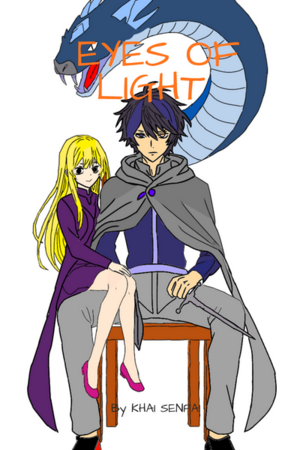Chapter 2:
A Glimmer in the Water
Threadbound
Maya appeared like a splash of color in the washed-out autumn landscape. Léa saw her first from a distance — a bright figure bustling around the cabin, carrying canvases and easels, turning a dead space into a living studio. Then, three days later, she saw her for real — by the edge of the lake.
Léa had come to feed the ducks, a daily ritual that led her each morning to the still waters. She walked the narrow path skimming the shore, her bare feet brushing the dew-wet grass. She cherished these solitary walks, moments when the world shrank to the gentle lapping of water against the stones and the whisper of reeds in the breeze. Reaching the wooden pier her grandfather once built, the stale bread in a linen pouch, a clear voice sliced through the morning air:
"Good morning!" called a young woman, waving.
Léa froze. The stranger stood by the water, amber hair tied in a messy bun held up by a pencil, a painter’s palette in hand. She wore a long saffron-colored dress that danced in the breeze and strands of colorful beads that chimed softly around her neck. So many colors, so much life — it stung Léa’s eyes, too used to the dull tones of her everyday world.
"My name’s Maya," the woman continued, her smile spontaneous and bright, dimples forming in her sun-kissed cheeks. "I just moved into the yellow cabin."
Léa instinctively took a step back. But something in Maya’s gaze held her there — a gentleness that didn’t carry the veiled threat she had learned to fear in men.
Maya stepped closer, her bare feet gliding over the pebbles with a dancer’s lightness.
"I’m painting the lake at sunrise. The light is magical here, don’t you think ?"
Léa opened her mouth by reflex, then shut it again. The words still existed somewhere inside her, but the path to her throat had been sealed for so long. She looked away, clutching the sack of breadcrumbs tightly against her chest.
Maya paused, tilting her head slightly, intrigued by the lack of response.
Léa shook her head, cheeks flushing. She gestured toward her ears, then tapped her lips, trying to indicate that she could hear but not speak.
A nod. Maya smiled — and that smile was like a sunbeam piercing through thick clouds. She rummaged in her leather satchel and pulled out a spiral-bound notebook, its pages smudged with paint, then removed the pencil from her hair. Amber curls tumbled over her shoulders, free. Léa caught her breath at the sight of that wild beauty — so different from her mother’s serene, contained grace.
"Here," said Maya, holding out the notebook and pencil. "This way we can talk. If you want to, of course."
Léa hesitated. To accept was to open a door she’d bolted shut for years. To refuse was to let this strange new warmth in her chest fade away.
She extended a trembling hand toward the notebook. Their fingers brushed during the exchange, and a jolt of electricity surged up her arm.
*My name is Léa,* she wrote in neat, almost childlike handwriting.
Maya leaned in to read over her shoulder. Her scent — a mix of fresh paint and jasmine — enveloped Léa like a warm wave. She felt her breath catch; her heart thudded so loudly she feared Maya might hear it. The jasmine made her head spin.
"Léa," Maya repeated, and the name sounded different on her lips, more musical. "That’s pretty. You live in that big house over there ?"
Léa nodded, then added: *Yes. I always have.*
"Then we’re neighbors! That’s wonderful!"
Léa looked up at her. From this close, she could see the golden flecks in Maya’s green eyes, the soft curve of her lips, the dimples that deepened when she smiled. Something warm and unfamiliar stirred in her belly — a feeling so strange she didn’t know how to name it.
*Are you a painter ?* she wrote, trying to mask her unease.
"That’s right. I paint what moves me. Landscapes, water scenes, people, emotions... I try to capture beauty — those moments that astonish us, hidden in the details of the world, you know ?"
Léa didn’t know, not really. Since her mother’s death, the world had seemed drained of color, reduced to shades of gray and forgetting. But something in Maya’s enthusiasm unsettled her, stirring echoes that had long lain dormant.
*I don’t go out much. I don’t see people.*
"Oh," said Maya, a shadow crossing her face. "You live alone ?"
*With Momma. My doll.*
Maya didn’t laugh. She nodded, as if it were the most natural thing in the world for a twenty-two-year-old woman.
"Dolls make good confidantes."
That unexpected understanding brought tears to Léa’s eyes. No one had ever taken Momma seriously. The rare visitors — doctors and notaries — looked at the doll with that blend of pity and unease reserved for the habits of overgrown children.
The ducks were growing restless, quacking and flapping near the dock. Léa remembered her mission and emptied the bag of bread into the water. Maya watched her from beneath a willow tree.
"You come here often ?" she asked.
*Every morning. To feed them and... to talk.*
Maya raised her eyebrows slightly but didn’t press. That delicacy surprised Léa, who was used to the clumsy intrusions of the well-meaning. How could she explain that she came here to speak to her dead mother, that the lake carried her silent murmurs across to the other shore — perhaps to the beyond, where Céleste waited ?
*I talk to my mother. She died when I was eight.*
"I’m sorry," Maya said, and the sincerity in her voice cut deep.
"Well," she added, straightening up. "I’ve still got work to do. See you around!"
She took a few steps, then turned back.
"By the way — keep the notebook. And the pencil too. That way, you can talk to me whenever you like."
She disappeared into the trees, leaving Léa alone with her racing heart and the lingering scent of jasmine in the morning air.
That night, Léa had trouble sleeping. Lying in bed with Momma clutched against her, she kept seeing Maya’s face, her graceful movements, her voice that turned ordinary words into music. For the first time since her mother’s death, she felt something like joy.
But in her restless dreams, another voice crept in among the vivid images — Céleste’s voice, soft and worried:
"Be careful, my darling. Be careful."
Léa awoke with a start. Momma was no longer in her arms. She searched the tangled sheets, then turned on the bedside lamp.
The doll stood again on the windowsill, facing the rented cabin where a light still glowed. Her button eyes were fixed on that distant brightness with unsettling intensity, and the red thread at her heart seemed to pulse in the golden lamplight.
Léa got up to retrieve her, noticing that one of the stitches near the heart had come undone. A bit of stuffing peeked through, like a wound beginning to bleed.
*You don’t like her, Momma ?* she mouthed silently, her lips moving without sound.
The doll didn’t reply, but Léa thought she sensed a silent disapproval in her rigid posture. She brought her back to bed, held her tight — but something had changed. For the first time, Momma’s embrace felt oppressive, like arms that refused to let go.
Outside, the light in the cabin went out, casting the house into darkness. But in Léa’s heart, something had been lit — something that would not go dark again.




Please sign in to leave a comment.